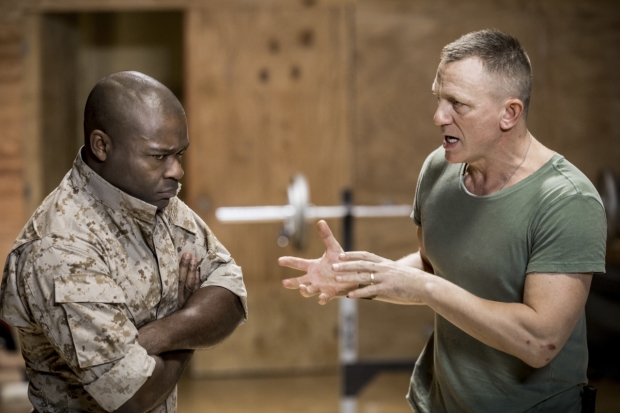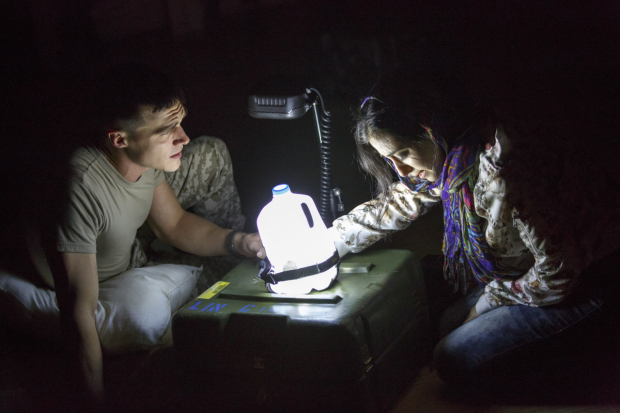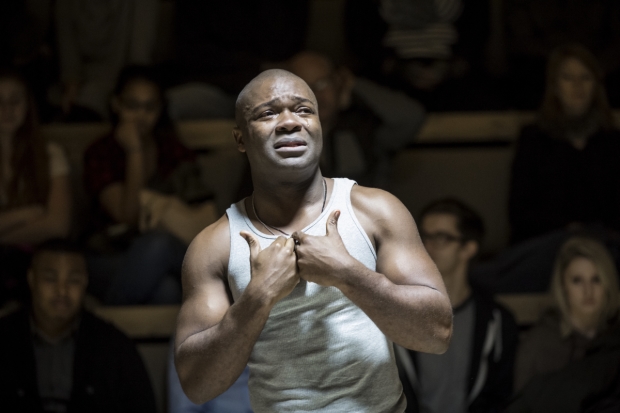Othello

(© Chad Batka)
Entering New York Theatre Workshop for the Sam Gold-directed production of Shakespeare's Othello is somewhat like boarding a roller coaster at Six Flags: We are handed a list of rules and prohibitions with our tickets. Ushers advise us in the sternest tone to stow our personal belongings in cubbies, while keeping our hands and feet within a designated box. This rigor establishes an expectation of breathtaking, whiplashing, downright dangerous theater — the kind at which someone could lose a limb if they're not careful. Sadly, Gold's lethargic production never delivers on this expectation. Three hours and 10 minutes later, we leave the theater completely unfazed and emotionally untouched.
This is all the more disappointing considering that Gold (Tony Award winner for Fun Home) is one of the brightest young directors in New York, known for bold and unorthodox choices. His vision for Hamlet proved so controversial that it was aborted in pre-production this summer. While evidence of a highly specific and potentially explosive mounting of Othello blankets the theater in the form of a transformational design concept, it never materializes in performance. Much of this has to do with dramaturg Michael Sexton's overly shaggy cut, which leaves the actors to needlessly hack through the dense forest of Shakespeare's unpruned verse. As is often the case in the theater, life or death springs from the text.

(© Chad Batka)
Shakespeare's tragedy of the jealous Moor of Venice is one of his most enduring: Othello (David Oyelowo) secretly marries Desdemona (Rachel Brosnahan), the daughter of Senator Brabantio (Glenn Fitzgerald), causing scandal. But when Othello explains their love before the Senate, Brabantio's rage subsides. Othello then defends Venetian Cyprus from a Turkish invasion and is hailed a hero. Ensign Iago (Daniel Craig) is resentful that Othello promoted Cassio (a boyish Finn Wittrock) as his lieutenant over him. With the help of Desdemona's scorned suitor, Rodrigo (Matthew Maher), he plots to destroy Othello by sowing the seeds of jealousy, subtly suggesting that his new wife has been unfaithful. It doesn't end well.
All of this occurs within a giant plywood box. Andrew Lieberman's set implies hastily constructed military housing: The wood still bears factory markings, while a row of cheap single mattresses occupy the narrow strip between the seating (the show is staged in a deep three-quarter thrust). Properties designer Kathy Fabian litters the floor with plastic artifacts (Guitar Hero controllers) and cheap personal affects (deodorant and mass-market paperbacks) that could belong to any modern American warrior. When the actors are not wearing fatigues, David Zinn outfits them in form-fitting Under Armour and Nike active wear, suggesting a force of men constantly training for combat. Testosterone practically drips from the stage.
Because the ceiling is completely covered in wood, lighting designer Jane Cox cannot use any of the hanging lekos and fresnels typical in the theater. Instead, she creates a shockingly diverse array of looks using mounted floodlights, overhead LED strips, and some well-placed practicals. Flashlights and MacGyver-style lanterns (one is made from a gallon jug of milk) become essential props in this dark, enclosed world. Several scenes are performed in near-darkness, a risky choice in a staging as soporific as this one.

(© Joan Marcus)
While the hypercharged atmosphere of male competition is a good jumping-off point for this story about toxic masculinity, it rarely reaches a boiling point. A bloody fight scene (choreographed with terrifying realness by Thomas Schall) between Cassio and fellow soldier Montano (a mas macho Slate Holmgren) is one of the strongest moments, but so many more go by without ever causing a dent in our imaginations. Even though there is always an assault rifle or two present, there is no sense of real danger.
At least Craig makes a memorably sociopathic Iago: He reaches out to each of us in his highly personal soliloquys, nearly winning us to his cause. With an unflinchingly icy gaze, he squashes any affection we might have for him in the second act through a series of coldly executed acts of brutality.
Maher provides blessed comic relief as a clownish, modern Rodrigo. "I cannot go to, man," he whines to Iago about an order to kill Cassio, and we all laugh at this dim-witted Venetian brah. Brosnahan delivers a contemporary Desdemona through stealthy acts of love and muted incredulity. Actor-composer Blake DeLong quietly (and somewhat aimlessly) strums his guitar at the side of the stage through much of the play, underscoring a production in which small choices are meant to make a big impact.
By contrast, Oyelowo seems to be in an entirely different production, one staged at Royal Albert Hall rather than this intimate makeshift barracks. He clenches his hands into fists and pummels the air, shouting his lines to the invisible fifth balcony. Not matter how loud he gets, our minds still wander, unable to focus on a performance that masks sloppiness in volume. His weepy self-pity in the final scene makes him more pathetic than sympathetic.

(© Chad Batka)
A charitable reading of Gold's production might view this as intentional: a harsh spotlight on the desperate tears of a man-child. Unfortunately, by committing his production to an exclusively militaristic setting, Gold unwittingly insulates his civilian audience, allowing too many to conclude that male insecurity and the aggression it spawns are problems specific to those who serve. Anyone living in America in 2016 (the year that "cuck" became a popular pejorative) knows this is not the case. This Othello sets us up for a reeling, but then lets us off the hook.











